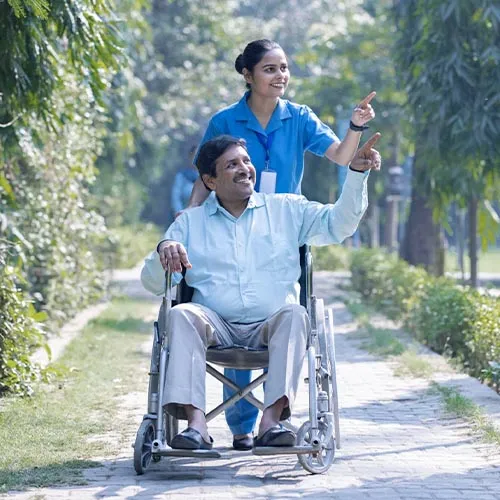The Importance Of Recreational Activities In Assisted Living Facilities In India
Benefits of Recreational Activities for Seniors
For elders, recreational activities can provide a variety of advantages, such as:
Physical Health: Seniors’ physical health can be improved by keeping them active and engaged through recreational activities. Seniors can maintain their strength, flexibility, and balance by engaging in activities like walking, yoga, and dancing.
Reduced Risk of Chronic Diseases: Frequent engagement in recreational activities can help lower the chance of developing chronic conditions including diabetes, dementia, and heart disease. Physical activity and exercise have been demonstrated to improve certain conditions.
Improved Mental Health: Seniors’ mental health can also be enhanced by recreational activities. Meditation, music therapy, and art therapy are a few practises that can help with mental health disorders including anxiety and sadness.
Enhanced Social Connections: Seniors can connect with people and fight feelings of loneliness and isolation by engaging in recreational activities. It has been demonstrated that social relationships are beneficial for both mental and physical health.
Improved Cognitive Function: Mentally taxing hobbies like crossword puzzles can aid in enhancing cognitive performance and halting cognitive decline.
Types of Recreational Activities for Seniors in Assisted Living Facilities
Seniors at assisted Living facilities in coimbatore India may have access to a variety of recreational opportunities, such as:
Physical Exercise: Exercise can help seniors maintain their physical health and wellbeing. Examples include walking, yoga, dancing, and strength training.
Creative Activities: Seniors can express themselves and enhance their mental health through creative hobbies including art therapy, music therapy, and gardening.
Social Activities: Engaging in social activities like book clubs, game evenings, and movie nights can help seniors make friends and fight feelings of isolation and loneliness.
Educational Activities: Lectures, workshops, and classes are examples of educational activities that can help elders gain new skills and remain active.
Volunteer Activities: Seniors might experience a sense of accomplishment and purpose through volunteering in activities like working at a food bank or spending time with young children.
Importance of Tailoring Recreational Activities to Seniors’ Needs and Preferences
Recreational opportunities should be tailored to the tastes and needs of each senior. While some seniors might like more physical hobbies, others could favour artistic or intellectual pursuits. It’s crucial to provide seniors with a variety of options and let them select the pursuits that appeal to them the most. Seniors might benefit from this by being encouraged and engaged in recreational activities.
While organising leisure activities, it’s also crucial to take elders’ physical limits and medical issues into account. Seniors with mobility challenges or other health issues should be able to participate in activities that are safe and easy to access.
The need for assisted living care facilities is increasing along with the senior population in India. These facilities offer senior citizens who require assistance with daily activities lodging, healthcare, and other services. Nonetheless, the function of leisure activities in these facilities is a significant factor that is sometimes disregarded. The physical, mental, and emotional health of elders can be significantly impacted by recreational activities. We’ll talk about the value of recreational activities in assisted living facilities in India in this blog post.
Benefits of Recreational Activities for Seniors
Recreational activities can offer a wide range of benefits for seniors, including:
Physical Health: Seniors’ physical health can be improved by keeping them active and engaged through recreational activities. Seniors can maintain their strength, flexibility, and balance by engaging in activities like walking, yoga, and dancing.
Frequent engagement in recreational activities can help lower the chance of developing chronic conditions including diabetes, dementia, and heart disease. Physical activity and exercise have been demonstrated to improve certain conditions.
Increased Mental Health: Seniors’ mental health can also be improved by recreational activities. Meditation, music therapy, and art therapy are a few practises that can help with mental health disorders including anxiety and sadness.
Improved Social Connections: Engaging in leisure activities can support seniors in making connections with others and overcoming feelings of loneliness and isolation.Social connections have been shown to have a positive impact on mental and physical health.
Improved Cognitive Function: Mentally taxing hobbies like crossword puzzles can aid in enhancing cognitive performance and halting cognitive decline.
Types of Recreational Activities for Seniors in Assisted Living Facilities
Assisted living facilities in India can offer a range of recreational activities for seniors, including:
Physical Exercise: Exercise can help seniors maintain their physical health and wellbeing. Examples include walking, yoga, dancing, and strength training.
Creative Activities: Seniors can express themselves and enhance their mental health through creative hobbies including art therapy, music therapy, and gardening.
Social Activities: Engaging in social activities like book clubs, game evenings, and movie nights can help seniors make friends and fight feelings of isolation and loneliness.
Lectures, workshops, and classes are examples of educational activities that can help elders gain new skills and remain active.
Volunteering: Volunteering can provide elders a sense of purpose and fulfilment. Examples include helping at a food bank or spending time with kids.
Importance of Tailoring Recreational Activities to Seniors’ Needs and Preferences
Recreational opportunities should be tailored to the tastes and needs of each senior. While some seniors might like more physical hobbies, others could favour artistic or intellectual pursuits. It’s crucial to provide seniors with a variety of options and let them select the pursuits that appeal to them the most. Seniors might benefit from this by being encouraged and engaged in recreational activities.
While organising leisure activities, it’s also crucial to take elders’ physical limits and medical issues into account. Seniors with mobility challenges or other health issues should be able to participate in activities that are safe and easy to access.
Challenges Faced by Assisted Living Facilities in Providing Recreational Activities
Assisted living facilities in India may face a number of challenges when it comes to providing recreational activities for seniors. Some of these challenges include:
Health Issues: Some elderly people may experience health issues that make it difficult for them to engage in specific activities. To make sure that activities are suitable and safe for elderly citizens with health difficulties, assisted living facilities may need to collaborate with healthcare professionals.
Cultural Disparities: While arranging recreational events, assisted care homes may need to take them into account. Popular activities in one culture can not be as well-liked in another.
Lack of Interest: Third, some seniors may not be interested in partaking in recreational activities due to a lack of interest. This can make it difficult to promote involvement and maintain seniors’ interest.
Tips for Providing Recreational Activities in Assisted Living Facilities
Despite these obstacles, assisted living facilities can utilise a variety of tactics to offer elders engaging recreational activities. Some pointers are:
Cooperation with Residents: Assisted living facilities can create and schedule recreational events in conjunction with residents.
Investment in Staff: Assisted living facilities can make an investment in staff members’ education and training to equip them with the knowledge and abilities required to direct recreational activities.
Cooperate with Local Community Organizations: Assisted living facilities can cooperate with regional community organisations to offer more resources and know-how for organising and executing leisure programmes.
Flexibility and adaptability: Facilities for assisted living may adopt a flexible and adaptive strategy when it comes to engaging in recreational activities. Hence, it may be guaranteed that activities are accessible and appealing to a wide range of seniors.
Regular Assessment: Assisted living institutions should evaluate the success of their recreational programmes on a regular basis. This can assist pinpoint problem areas and guarantee that elders are getting the best programming available.
Conclusion
Seniors at assisted living homes in India may see a considerable improvement in their health and wellbeing thanks to recreational activities. These pursuits can strengthen social ties while also enhancing one’s physical, mental, and emotional well-being. Recreational activities should be tailored to seniors’ needs and preferences, and assisted living facilities should make the staffing and resource investments necessary to deliver high-quality programming. Assisted Living Facilities can support elders in leading happy, healthy, and satisfying lives by giving priority to leisure activities.
Visit Our Website: https://elca.in/



